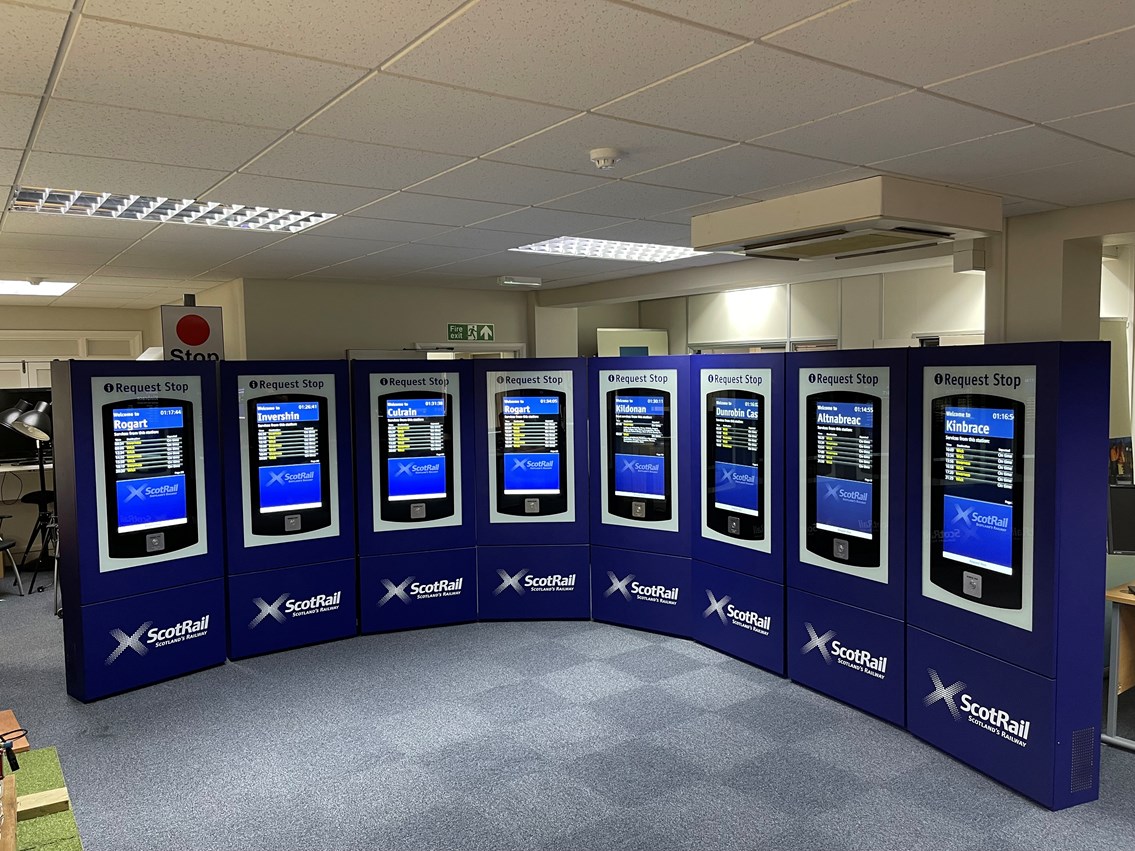Tuesday 28 Dec 2021
Waving good-bye to hand-signal stops on Far North Line
- Region & Route:
- Scotland’s Railway: Scotland
Work is underway at eight stations in the Scottish Highlands to install ‘request to stop kiosks’ which will allow passengers to access the next planned service.
As part of a broader package of improvements to the line's radio signalling system, worth approximately £5 million, eight stations on the Far North Line will benefit from the addition of the Request to Stop kiosks on platforms.
Scotscalder, Altnabreac, Kinbrace, Kildonan, Dunrobin Castle, Rogart, Invershin and Culrain will all have the new systems installed.
This will enhance the current operation of the railway by allowing passengers to request the next train stop at these stations using a radio system linked to the driver’s cab.
Due to their geographical remoteness, patronage at these stations is amongst the lowest in the UK and consequently they operate on a ‘request to stop’ basis – currently requiring the need to hand signal approaching trains to stop.
The addition of the kiosks will allow passengers arriving at the stations to make their requests direct to the driver’s cab; removing the need to hand-signal, and introduces a system which is more user-friendly and will improve operational performance.
This new equipment is planned to go live across all eight ‘request-to-stop’ stations on the line from Summer 2022. Scotscalder has been selected as a trial location where a period of dual running will extensively test the reliability of the enhanced system prior to it being rolled-out.
As well as the installation of the ‘request to stop kiosks’ Network Rail will also upgrade existing radio communication masts and antenna and install new equipment at Muir of Ord and Wick stations to enhance radio coverage.
This will improve the reliability and resilience of the communications network across the route which will improve the overall passenger experience for those travelling on the line.
Cara Healy, Network Rail’s development manager for the work on the Far North Line, said: “Enhancing the radio network will make the experience of using ‘request stop’ stations more straight forward and will cater for the increased number of tourists visiting the area, particularly during the COVID-19 pandemic.
“We are working through the winter to get this equipment ready to ‘go live’ ahead of the busier summer months.
“This new system will make it easier to use some of the most remote stations on our network and hopefully help encourage more people to travel into the Highlands to walk, climb, cycle and sightsee.”
If anyone has any questions or concerns in relation to the project, they can call our 24-hr helpline on 03457 11 41 41 or via our website www.networkrail.co.uk/contactus
Notes to Editors
Notes to Editors
Installation of ‘request to stop kiosks’
Scotscalder, Altnabreac, Kinbrace, Kildonan, Dunrobin Castle, Rogart, Invershin, Culrain
Upgraded or additional radio communications equipment
Kildonan, Muir of Ord and Wick.
Request to stop Kiosks consist of a platform unit with timetable display and request to stop button, signage and an adjacent radio mast. It will enhance the radio network on the line to enable requests to be made direct to the cabs of drivers approaching the stations.
Contact information
Passengers / community members
Network Rail national helpline
03457 11 41 41
Latest travel advice
Please visit National Rail Enquiries
Journalists
Network Rail press office - Owen Campbell
NR Press Office 0141 555 4108 / 07515 617073
Owen.Campbell1@networkrail.co.uk
About Network Rail
We own, operate and develop Britain's railway infrastructure; that's 20,000 miles of track, 30,000 bridges, tunnels and viaducts and the thousands of signals, level crossings and stations. We run 20 of the UK's largest stations while all the others, over 2,500, are run by the country's train operating companies.
Usually, there are almost five million journeys made in the UK and over 600 freight trains run on the network. People depend on Britain's railway for their daily commute, to visit friends and loved ones and to get them home safe every day. Our role is to deliver a safe and reliable railway, so we carefully manage and deliver thousands of projects every year that form part of the multi-billion pound Railway Upgrade Plan, to grow and expand the nation's railway network to respond to the tremendous growth and demand the railway has experienced - a doubling of passenger journeys over the past 20 years.
Follow us on Twitter: @networkrail
Visit our online newsroom: www.networkrailmediacentre.co.uk

